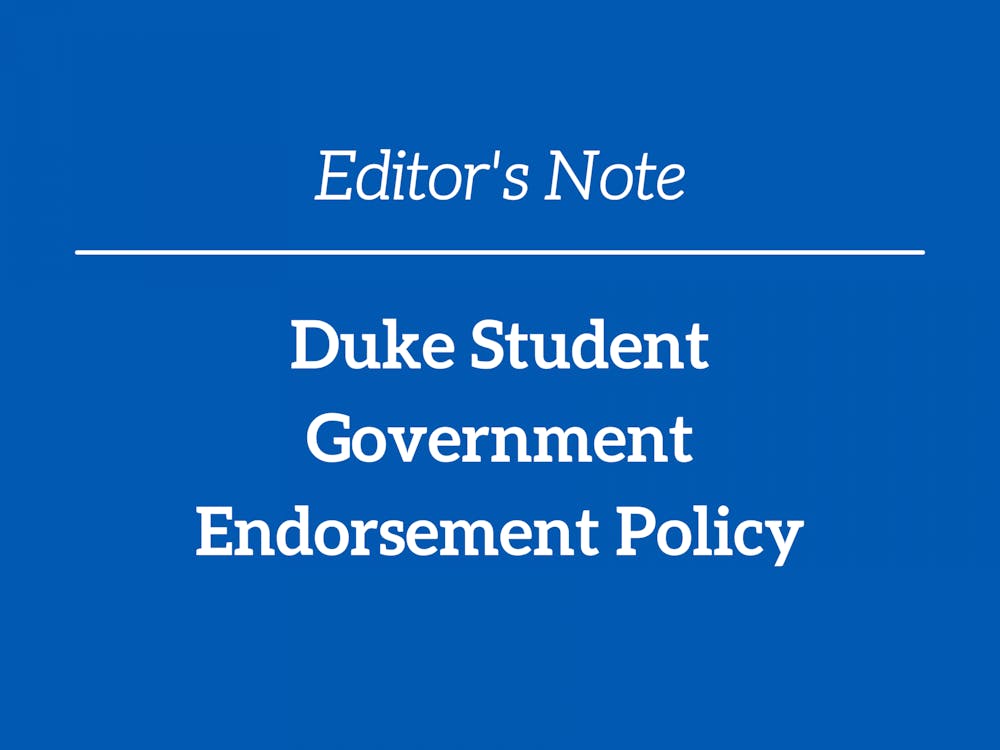The Chronicle will be publishing endorsement letters for the 2021 Duke Student Government presidential election from Tuesday, March 2nd to Monday, March 8th at 11:59 p.m. The candidates for executive vice president have agreed not to seek endorsements this year. No endorsements will be published the days of the election. The final deadline for endorsements is Monday, March 8th at 7 p.m.
This year's candidates for president are juniors Christina Wang and Carlos Diaz. The election will take place online March 11 and 12.
We will accept letters from any and all student organizations, so long as the groups adhere to the rules stipulated below. We will not accept personal endorsements from individuals.
1. Organizations must offer to meet with all candidates for any position being endorsed, and the candidates must be given at least 24 hours to respond. If a candidate voluntarily declines to meet, the endorsement meeting may go on as scheduled, and the candidate's absence must be noted in the endorsement letter.
2. In the endorsement process, organizations must give equal speaking and questioning time to each candidate for each office. No candidate may receive more time than another.
3. Members of organizations who decide they want to participate in endorsements for a position must remain in the room for every candidate's appearance. Members may not leave and return, or arrive late. If they do so, they may not participate in any portion of the endorsement process for that position, including deliberations and voting.
4. To avoid even the appearance of impropriety, The Chronicle expects that members of organizations with significant personal or professional attachments or associations with candidates will remove themselves from the endorsement process for that position. This includes public or substantial participation in the campaign of any one individual. Any conflict of interest that would jeopardize a non-prejudiced review and consideration of a candidate should result in a recusal. If a member of an organization recuses him or herself due to conflicts of interest with any one candidate for a position, that member may not participate in the endorsement process at all for that position. This includes asking questions in meetings with the candidates and writing the endorsement. Members of organizations who recuse themselves must be listed as having done so in the text of the endorsement letter.
5. If one of the candidates currently is or was previously a president or officer of an organization, that organization is precluded from issuing an endorsement for that position.
6. If an organization wishes to publish an endorsement letter, the president of the organization must email editor-in-chief Matthew Griffin (matthew.l.griffin@duke.edu) and Opinion Editor Mihir Bellamkonda (mihir.bellamkonda@duke.edu). All candidates running for each endorsed position must be CC'd on the email as well. The email must include an attached endorsement letter and the following statement: “I, the president of [organization name], certify that all Chronicle endorsement rules were followed in the formulation of this letter. I understand that failure to adhere to the rules undermines the election process, as well as the integrity of my organization and The Chronicle.”
7. Endorsement letters must be signed by the leader of the student organization and include their full name, school and graduation year. Endorsement letters must include a list of all organization members who recused themselves, if any.
8. If a candidate wishes to challenge an endorsement letter on the grounds that any of rules above have been violated, he or she may submit by email a formal challenge to the editor-in-chief stating his or her claims. The president of the organization must be CC'ed and may respond to the challenge. This challenge must be received within three hours of the endorsement letter email sent under Rule 6. The Chronicle retains the final and exclusive right to adjudicate the merits of any such challenge.
9. There is no guarantee that endorsement letters will be published. The letters with the greatest likelihood of being published are those that arrive earliest and are concise. Letters may not exceed 325 words. Organizations submitting endorsement letters are encouraged to register their endorsements through DSG and receive more information about the position of DSG president and executive vice president.
10. If The Chronicle determines that any of the aforementioned rules have been violated in the formation of an endorsement letter, that letter will not be published.
Mihir Bellamkonda is a Trinity senior and Volume 116 opinion editor. Matthew Griffin is a Trinity junior and Volume 116 editor-in-chief.
Get The Chronicle straight to your inbox
Sign up for our weekly newsletter. Cancel at any time.
Matthew Griffin was editor-in-chief of The Chronicle's 116th volume.
Mihir Bellamkonda is a Trinity junior and a Managing Editor of the Editorial page. His column, "small questions," runs on alternate Tuesdays.

